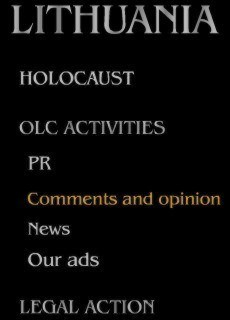|
This coming week will see the opening of what I refer to as "Baltic Neo-Nazi/Ultranationalist March Month." Within exactly 29 days, four such marches will take place in the capital cities of the Baltic European Union members - Lithuania, Latvia, and Estonia. And while there obviously are different local nuances, the similarities between the marches are far too numerous to ignore, reflecting a dangerous trend, which deserves to be treated seriously by Brussels.
All the marches are being sponsored by right-wing organizations with fascist sympathies and zero tolerance for local minorities. At past marches in Lithuania, the most popular slogan shouted was "Lietuva lietuvams" (Lithuania for Lithuanians); and in Estonia, it has already been announced that the theme of this year's march will be "Eesti eestlastele" (Estonia for Estonians). In other words, as far as they are concerned, only ethnic Lithuanians or Estonians belong in their country.
The sponsors also share a critical view of the accepted narrative of World War II and the Holocaust, which includes the extensive and zealous collaboration by tens of thousands of Lithuanians, Latvians and Estonians in the mass annihilation of not only their fellow Jewish citizens, but also of thousands of Jews deported from elsewhere in Europe to the Baltic countries to be murdered there, as well as tens of thousands of Jews murdered by security police units from Lithuania, Latvia, and Estonia in Belarus. As far as the organizers are concerned, the real "genocide" was that supposedly committed in the Baltics by the Communists, whereas the Holocaust was primarily a respite from the two periods of Soviet repression and persecution in 1940-1941 and 1944-1991.
The revisionist bent of the marchers was boldly evident in both Lithuania and Latvia in previous such events. Thus, for example, the Latvian march is ostensibly to honor the locals who fought alongside the Nazis in the two Latvian SS divisions, whom the marchers seek to portray as Latvian freedom fighters. They conveniently forget three important historical facts: that the goal of these divisions was a victory of the Third Reich, that Nazi Germany had absolutely no intention of granting Latvia independence even if it had won the war, and that among these so-called "Latvian heroes" were quite a few former members of the Latvian Security Police who had actively participated in the mass murder of Jews, local and foreign. In Lithuania, prominently displayed among the nationalist heroes was Juozas Ambrazevicius, the Prime Minister of the Lithuanian Provisional Government established in July 1941, which fully supported the Third Reich and encouraged Lithuanians to participate in the mass murder of their fellow Jewish citizens, hardly a qualification for glorification. At these marches, Lithuanian swastikas, a slightly altered version of the Nazi original to avoid legal problems, were a very common sight.
All four marches are being held in the main avenues of the capital cities, and three of them are celebrations of local independence days. The first march, on February 16 in Kaunas, which was the capital of the first Lithuanian republic in modern times, marks the independence granted in 1918. The second, a week later, on February 23 in Tallinn, marks Estonian independence, and the third, which will be held in the center of Vilnius on March 11, marks the renewal of Lithuanian independence in 1990. (The Latvian march, which will be held in Riga on March 16, is linked to a historic battle of the Latvian Legion.) The combination of exclusionist nationalist slogans with the achievement of freedom for the Baltic peoples is a toxic combination which sends a racist, xenophobic and anti-Semitic message which, at least in theory, runs counter to the values of the European Union.
With the exception of the Estonian march which is relatively new, being held this year for only the second time, I have had the painful experience of personally monitoring each of the three Lithuanian and Latvian marches in recent years. I have also tried, together with Prof. Dovid Katz of Vilnius, the founder and editor of the website www.defendinghistory.com, who has courageously sought to expose and combat Holocaust distortion in Europe and especially in the Baltics, to convince local authorities to either ban the marches or at least to distance them from the city center. Not only have these efforts been unsuccessful, lacking support from any Western country, but the number of participants appears to increase every year.
Obviously, the time has come for Brussels to deal with this potentially very dangerous phenomenon by taking more active measures to combat local xenophobia and anti-Semitism and by working together with the post-Communist "new" democracies of Eastern Europe to curb their enthusiasm to rewrite the history of World War II and the Holocaust. In that respect, perhaps the most effective tool would be to grant Communist victims the recognition and commemoration they deserve, making it abundantly clear that while they were undoubtedly victimized by a criminal regime, their plight was intrinsically different than that of the Jews under the Third Reich.
i24news.tv
| 

